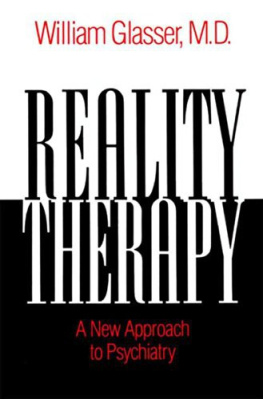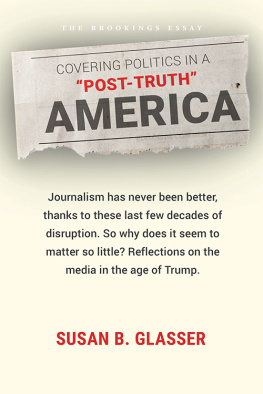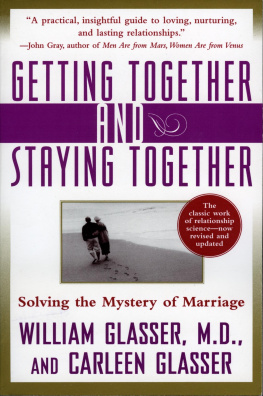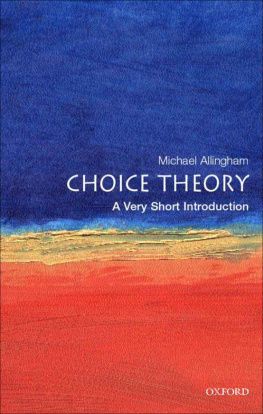The external control psychology that we use when we have difficulty getting along with others is destructive to the relationships all of us need. In my 1998 book, Choice Theory: A New Psychology of Personal Freedom, I offer a new psychology that is the diametric opposite of external control. The more it is used, the more it improves our relationships
In that book I propose that we give up external control psychology completely and replace it with choice theory to enable us to do something we have failed to do since history began: significantly improve the way we get along with one another. Doing this would result in better marriages, happier families, more successful schools, and increased quality and productivity in the workplace.
Since the best way to understand theory is through its practice, this book examines the bossy or controlling language we use when we can't get along with one another. Specifically, we use the language associated with criticizing, blaming, complaining, threatening, punishing, and/or rewarding to try to get what we want. This external control language always harms and often destroys the relationships we must have for happiness and success. External control is a plague on all humanity.
Choice theory is exactly the opposite. Its language, never bossy or controlling, is always an attempt to work out the differences between people in a way that satisfies both parties. For example, open, fair, and noncoercive negotiation is always the choice of people who use this new theory. They will listen, support, sustain, tolerate, and be patient with one another.
The difference between the two languages is startling. External control speech is peppered with the imperative tense, with should, must, and have to, plus threats of punishment if you dont do what youre told and promises of reward if you do. Choice theory language helps us to work out problems with one another; external control language increases them.
In the following pages this new way of expressing ourselves will be clearly seen in four situations. In love and marriage, where both parties should be working to keep the power in the relationship reasonably close to equal, external control language will quickly and permanently destroy the balance of power that is necessary if the couple is to have any chance for happiness. In marriage, the most difficult relationship for people to walk away from, the language will escalate to cursing, nagging, scolding, henpecking, arguing, and withdrawing. No marriage can long withstand such an onslaught.
In parent-child, teacher-student, manager-worker relationships, in which the power is almost always in the hands of the parent, teacher, or manager, the parties should work to give children, students, and workers more power than they usually have in the external control world we live in. The more power the parent, teacher, or manager gives, the more chance each has to achieve his or her goals.
Choice theory language is based on the belief that the only person whose behavior each of us can control is ourself. All we can give and receive from others is information. But information by itself cant make us do anything. Each of useven in the face of a severe threat, if we are willing to suffer the consequencescan choose what we do. And no matter how we are threatened, no one can make us think the way they want.
Finally, the main difference between external control language and the choice theory alternative is creativity. Without some creativity, any close relationship will grow stale. All people are capable of creativity, but both the language and thought processes of people who rely on external control is almost totally noncreative. It is stereotypical, made up mostly of a few overused words and threats. In contrast, choice theory language is rich with creative, caring words, never any threats.
As much as most people appreciate finding creative ways to deal with their relationships, they do not realize how their use of external control language keeps them in a noncreative rut. This book will introduce you to a new way to talk with people and, in a sense, a more creative way to live your life. Even a creative insult is preferable to the ubiquitous f you, the least creative expression in any language.
As you face the open book, the examples of external control language are on the left-hand pages. Opposite, on the right, are examples of how choice theory language would be used in the same situation. Remember, choice theory language is new, and your first impulse may be to say: It wont work, its too permissive, or Im afraid Ill lose control. Coercion and punishment are quicker and better. And in fact, for a short time in some situations in which you have a lot of power, external control language may seem to work. But in the long run, never does and never will. The misery of accepting external control is too high a price for most of us to pay.
After you read a few pages you may want to cover up the right-hand page and try to create your own choice theory alternative before you look at ours. Its good practice; ours are hardly the only choices. Guide yourself by thinking: If someone said that to me, would I feel as close to that person as I do now?
Keep in mind that the relationships we need are rarely short term. The effect of external control is cumulative; in rearing children it may seem to surface suddenly in adolescence. But its not sudden. External control is always resisted, and over time this resistance builds and finally erupts, making what was initially a small problem more difficultoften impossibleto solve. With external control you may win a few battles but you always lose the war.
How many times do I have to tell you? Bedtime is nine oclock! No television tomorrow night if you dont go right to bed this minute
As long as youre quiet and dont disturb anyone, you can go to bed when you get sleepy. But before I get too sleepy, would you like me to read you a story?
Get off that phone right now! Im serious. Im just about ready to stop letting you use the phone at all after dinner.
Things with the phone just arent working out. No one can get through. Grandma said she tried for three hours last night. Im willing to put in call-waiting, but when someone calls I need you to get right off. Can we try that?
Your rooms a pigpen. Clean it up or no car this weekend.
Look, Im at the point where all I want is for you to keep your door closed. But I have to be honest: Id like you to clean up your room; it bothers me. If you want some help from me, ask and Ill be glad to pitch in. But Im not going to clean it for you anymore.
Do your homework now. I dont care what it is. You have to do it or no TV tonight.
Okay, Im not going to argue with you. Lets look that homework over together to see if you understand it. And Ill be right here to help you if you get stuck.
If I catch you anywhere near those kids again, youre grounded for life. All they ever do is get into trouble.
Im frightened at the idea of you being out alone with those kids at your age. Its okay if you see them here when Im home. If I get to know them a little better, I may change my mind. But if you have a better idea, Ill listen. As long as we keep talking, itll be okay.
You wanted the dog. Well, Ill tell you, Im sick and tired of walking her. Shes going to the pound if you dont start taking better care of her.







